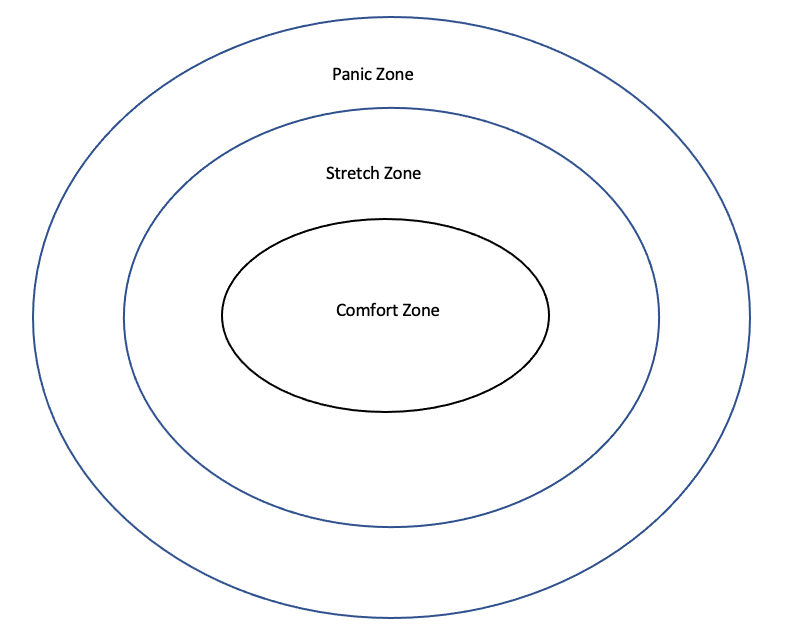In this blog I talk about two concepts that can help you to make the most of your potential. These concepts are:
- having a growth mindset, as opposed to a fixed one
- the zone of proximal development.
Making the most of your potential is also about your confidence levels and thinking about how you can show yourself in a positive light to others. It’s especially important to think about if you are going for a job interview or starting a new role. You want to make the best impression in as short a time as possible.
Growth v a fixed mindset
A mindset is part of a belief system that can govern our behaviours and it can be beneficial or limiting. Often mindsets are passed on to us via parents or adults that are responsible for us in early childhood. Carol Dweck in her book ‘Mindsets’ has written extensively about how some people have ‘fixed mindsets’ and others have ‘growth mindsets’. Fixed mindsets, where the individual feels that they cannot learn anymore, are particularly limiting. It is accepted that it is important to encourage growth mindsets. These are where people believe that they are capable of changing, improving their skills and learning in many different areas of life. The good news is that if you have a growth mindset then you will be able to change any unhelpful, limiting behaviours.
The stories we tell ourselves
A quote from Brene Brown and an excellent coaching question, is ‘what are the stories we are telling ourselves?’ This ‘inner critic’ that we all have is important to listen to, but sometimes it can tell us that we are not good enough. Changing your mindset to a growth mindset can really help your inner critic to become more positive. So recognising this key concept of ‘growth v fixed mindset’ can be so powerful that it can change your life.
What are these stories exactly:
If we have a growth mindset, we tell ourselves:
- ‘Failure is a chance to grow’
- ‘I can learn to do almost anything I want’
- ‘Challenges help me to grow’
- ‘My effort and attitude determine my attitudes and how I cope with things’
- ‘Constructive feedback is welcomed by me’
- ‘I am inspired by other people’s success stories’
- ‘I love trying new things’
If we have a fixed mindset, we tell ourselves:
- ‘Once I try and fail at something, I discover the limit of my abilities’
- ‘I’m either good or I’m terrible at something’
- ‘My abilities are fixed and unchanging’
- ‘I don’t like to be challenged, that feels like someone is criticising me’
- ‘When I get frustrated with a task, I give up’
- ‘Feedback and criticism are personal and unwelcome’
- ‘I stick to what I know I’m good at’.
Try learning about these different attitudes, and stopping yourself if you start to think in a fixed way. You can ask yourself, ‘I normally think like this (in a fixed mindset sort of way), but could it be helpful to change to think in more of a growth mindset manner? I know it’s not easy, especially if you are used to thinking in a certain way all your life, but I want you to know that it is possible. It is never too late to change and challenge yourself to think differently. You’ll note that this is a very much a growth mindset statement in itself!
The Zone of Proximal Development
The zone of proximal development (ZPD) is a theory that was first proposed by Lev Vygotsky and it has been popularised by many educational professionals. The ZPD refers to what the learner can achieve with some guidance. It involves them moving into learning new skills, by moving the learner out of their comfort zone, slowly and by taking baby steps.
The learning zone model below has come out of this theory:

In the comfort zone you can feel:
- Lifeless, secure, bored, unchallenged and lazy
Whereas, in the stretch zone you can feel:
- Excited, anticipating, challenged, expectant and alive
In the panic zone you can feel:
- Fearful, tense, exhausted, fed up, anxious, annoyed, frustrated and stressed.
The stretch zone is ideal for personal and professional development. The comfort zone can be a place to feel safe – it’s a good place to reflect on knowledge and experiences. So it’s good to be there sometimes. The panic zone is to be avoided.
Conclusion
Being self-aware and knowing when you are taking on too much is really important. I think that you can use these two concepts together, as they naturally fit with each other. As Steven Bartlett says ‘Stop telling yourself you’re not qualified, not worthy or not experienced enough. Growth happens when you start doing the things you’re not qualified to do’.
Therefore, try to be in a growth mindset when you take on something new and different and don’t be shy of moving out of your comfort zone. Be brave and go out there and let the world be your oyster!
If you liked this blog, you might like to read:
By the way, I’ve decided to publish my new blogs on Medium. You can access them from my Medium profile page.

